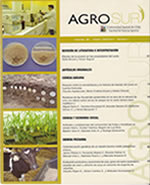Evaluation of the reproductive performance in female guinea pigs (Cavia porcellus) of the Peruvian line
Main Article Content
Abstract
The production of guinea pigs in the department of Nariño, Colombia, has major importance for family and commercial breeding systems because it offers the opportunity to massify the production due to the low investment costs, the optimisation of land use, and the generation of an income that allows improving the quality of life of the producer. However, there are balanced foods available in the market with an outdated formulation that does not fit the requirements of different stages of production because they are being generated under controlled laboratory conditions, making necessary to evaluate the productive and reproductive performance of C. porcellus females under different dietary inclusions of energy and protein. This study was carried out at the Centro Internacional de Producción Limpia Lope in the city of Pasto (Nariño). One-hundred and eight females and 36 males with an average weight of 1,100 ± 149 grams (in cages) were analysed. The evaluated diets included 3 forage:supplement ratios (concentrate) and 3 protein and energy levels, obtaining 9 experimental treatments; a completely randomised design was used. Only statistically significant differences (p < 0.05) were observed between treatments for litter size at birth, with T3 being greater than T9.

